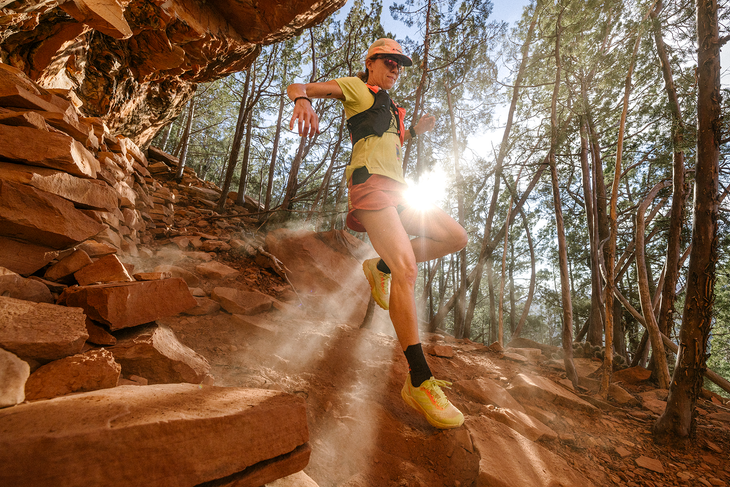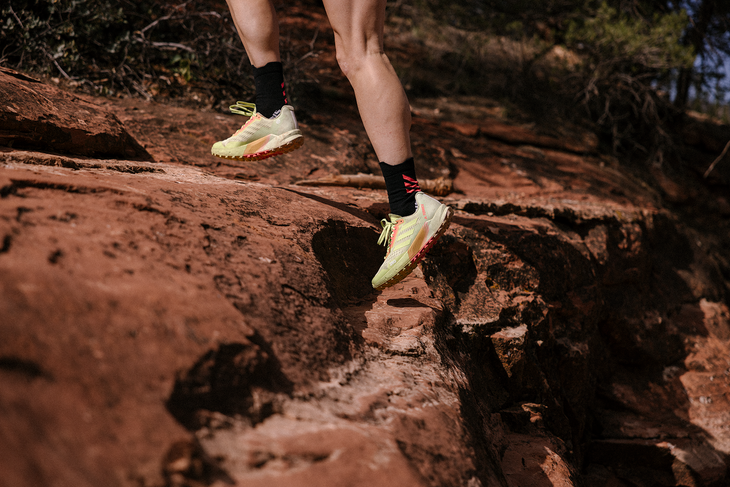Products You May Like
Professional ultrarunner and adidas TERREX athlete Abby Hall has made it to the top of running podiums around the world through hard work and an unwavering belief in herself. The Flagstaff, Arizona-based runner took second at the 2021 Canyons 100K, CCC in France, and at this year’s Transgrancanaria, to name just a few recent highlights. But Hall’s path to success wasn’t fast or easy; she spent years learning how to run on trails and how to race them. Along the way she made valuable mistakes like going out too fast at 100-milers and barely meeting time cutoffs. She knows how to get from being a beginner trail runner to earning a podium spot as an ultrarunner, and here she breaks down her advice for how you can level-up your trail running this season. Whether you’re just starting out or looking to achieve new goals, use these five tips to become more confident and successful on the trail.

Be Curious
Hall, 31, grew up running and found joy in the freedom of cruising around the woods and grabbing mid-run slurpees with her cross-country teammates. But it wasn’t until she moved to L.A. after a college running career that she started to create her own distinct relationship with the sport outside of a team structure, with daily practices and scheduled races. “There was no one waiting for me, no race to train for next, but there was still something burning,” says Hall. Even after years of running, Hall recognizes there is always something new to learn. Hit a roadblock or plateaued? She recommends staying curious and channeling a beginner mindset to overcome new obstacles and challenge yourself.
That curiosity sparked Hall’s journey from road running to trail running. Hiking in the Sierra Nevada, Hall’s route converged with the last section of the 223-mile John Muir Trail (known as Nüümü Poyo—the People’s Trail—by the Paiute people). She immediately wondered what the fastest known time (FKT) was for the John Muir Trail. When she got home she bought all the books she could find about trail running and ultrarunning. “I wanted to learn all about it because I’d decided I was going to go for the FKT on the John Muir Trail.” At the time the supported female record was 3 days, 20 hours according to fastestknowntime.com.
Keep it Simple
Hall measures her training based on effort and duration rather than pace and distance, a shift that has been instrumental for her growth. “The best way for us to gauge the impact of technicality and grade is just by listening to what our bodies are telling us,” she says. Often, Hall will head out without a set plan of where she’ll run, instead seeking trails or routes she’s naturally drawn to and that offer up a little inspiration. This approach means she could encounter a variety of terrain and she needs a shoe to match, which is why she loves the new adidas TERREX Agravic Flow 2, a do-it-all workhorse. The shoe is light and comfortable, with the easy fit of a road shoe and a sturdy build that offers confidence and protection on technical trails. That versatility makes the Agravic a simple choice for Hall, who might experience dirt roads and rocky singletrack on a single run.
Recovery is also a crucial part of effective training, and Hall says that runners often have a tendency to overcomplicate it. “My coach [Jason Koop] always says the best recovery tools are sleep and food,” says Hall. Beyond rest and nutrition, Hall says to keep it simple—get to know your body, listen to what it tells you, address pain before it becomes an injury, and don’t be afraid to take a few days off if something feels wrong.
Find Your Spark
Before Hall ever ran an ultra, she had a feeling she could be pretty good at it. “I dove in head first,” Hall says. So she moved to Boulder, Colorado, in 2016 so she could train for her first FKT attempt on the John Muir Trail. There she signed up for her first 50k and first 50-miler. Her new friends in Boulder—young women who were deeply invested in trail running and crushing highly competitive ultras like the Leadville 100—opened her eyes to the possibilities of where she could take the sport.
“Get to know your own personal spark and make sure you listen to it,” says Hall. That spark or your “why” is your unique motivation. That spark kept Hall going after setbacks, like her FKT attempt on the John Muir Trail (she just wasn’t ready and had to bail on day one).
Believe in Yourself
Early in her running career, Hall had huge goals, but she was terrified to say them out loud. “It requires a lot of vulnerability to put yourself out there with a goal and say, ‘I believe I’m capable of this kind of result,’” she says. “I’ve often felt there’s a stigma around speaking confidently about your goals, as though our self-belief needs to be earned.”
But not being honest about your goals can create a disconnect between your motivation for running—your spark—and how you show up in the world and on the trail. Hall recently quit her full-time job as a designer to commit to running full-time as an adidas athlete. She attributes much of her success to this leap. She believes taking yourself and your goals seriously is the best way to honor that spark and create space for big dreams to materialize.

Trust the Process
Hall has seen her fair share of failures in her career, and they’ve helped her figure out how to win. “Failed goals are interesting to me,” she says. “Those were always the corners that I turned that set me up for success the next time.” At the starting line of the Leadville 100 in 2017 and 2018 Hall believed she could win. Both years ended in disappointment when she barely got across the finish line before the time cutoff. When she attempted the FKT on the John Muir Trail again in 2020, however, Hall had one of the biggest turning points in her life. She didn’t set a record (though she came within a few hours of doing so), but worked through fear, vulnerability and perfectionism. The races she’s run since have been totally different. Starting lines now feel like a celebration rather than a proving ground. As a result of this shift in her mindset, Hall has achieved some of her best results.
To this same end, Hall recommends striving to be present along the way, focusing on the things you can control, and “running the trail you’re on” as her husband, Cordis, likes to say. This means listening to your body if it needs rest, letting go of expectations, trusting that hard work will pay off, and getting away from categorizing days and runs as ‘good’ or ‘bad.’ In short, your first goal should be to enjoy the process of pursuing your goals.

